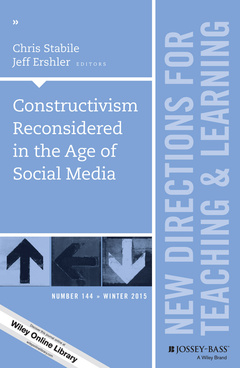Constructivism Reconsidered in the Age of Social Media New Directions for Teaching and Learning, Number 144 J–B TL Single Issue Teaching and Learning Series
Coordonnateurs : Stabile Chris, Ershler Jeff

- particular areas influenced by constructivist thinking and social media, such as student learning, faculty development, and pedagogical practices,
- practical and useful ways to engage in social media, and
- dialogue and discussions regarding the nature of learning in relation to the technology that has changed how both faculty and students experience their educational landscape.
Chris Stabile, Jeff Ershler
1. The Learning Virus: An Affective, Constructivist Movement Shaped by Ultrasociality in the Age of Social Media 5
Jeff Ershler, Chris Stabile
Redefining the discourse toward a “better fit” cultural framework of beliefs, thought, language, and action through ultrasociality, a constructivist meme can help nurture an epistemological break (or rupture) from the traditional objectivist paradigm in education.
2. Constructivism and Learning in the Age of Social Media: Changing Minds and Learning Communities 23
Dawn E. Schrader
Social media provide new means and opportunities for learning that are consistent with major tenets of both social and cognitive constructivism, and extend the process of learning and meaning construction to more diverse communities and universally accessible shared activities that are jointly and concurrently engaged in by both peers and experts.
3. Leveraging Social Media for Instructional Goals: Status, Possibilities, and Concerns 37
Mark Taylor
This chapter addresses issues faculty should consider when exploring the possible use of social media in instruction with today’s learners.
4. Teaching Students to Think Critically About Social Media 47
Stephen D. Brookfield
Instructors can incorporate social media and the immediacy and accessibility to information these offer in ways that support student learning, while simultaneously encouraging students to be critical of these same media systems and platforms.
5. Learner-Centered Online Instruction 57
Barbara McCombs
This chapter offers a theoretical rationale and an explanation of evidence for using research-validated, learner-centered principles and practices in online course development, highlighting the evidence based practices that have been used successfully to develop online courses that engage and retain students.
6. Implications of Graphic Organizers in an Age of Social Media 73
Michael Record
This chapter deconstructs the definition of graphic organizer, reimagining it for a social media age, leading to a more mindful use of the concept as an entire approach to teaching and learning rather than one specific set of tools.
7. How Critical Reflection Benefits Faculty as They Implement Learner-Centered Teaching 87
Phyllis Blumberg
Critical reflection assists faculty as they transition to using learner centered approaches. When this reflection occurs within the context of social media, they can obtain reinforcing feedback and support.
8. Learner-Centered Faculty Development 99
Kevin Yee
To maximize their effectiveness, faculty developers should not merely advocate for an active learning approach but also enact it in their own workshops and service-oriented interactions with faculty, even extending to their use of outreach and social media.
9. Toward Education 3.0: Pedagogical Affordances and Implications of Social Software and the Semantic Web 109
Mark Allison, Lynn Marie Kendrick
This chapter explores the implications of this new educational paradigm from a technical standpoint and proposes a constructivist aware approach to best leverage its significance.
INDEX 121
Jeff Ershler, JD, is a graduate of the University of the Pacific, McGeorge School of Law and has completed an educational leadership graduate program from Barry University.
Date de parution : 01-2016
Ouvrage de 136 p.
15x24.4 cm
Disponible chez l'éditeur (délai d'approvisionnement : 12 jours).
Prix indicatif 31,03 €
Ajouter au panierThème de Constructivism Reconsidered in the Age of Social Media :
Mots-clés :
affective; media; ultrasociality; movement shaped; jeff; age; ershler; constructivist; social; chris; framework; beliefs; stabile; cultural; discourse; traditional; paradigm; meme; objectivist; education; epistemological; communities



